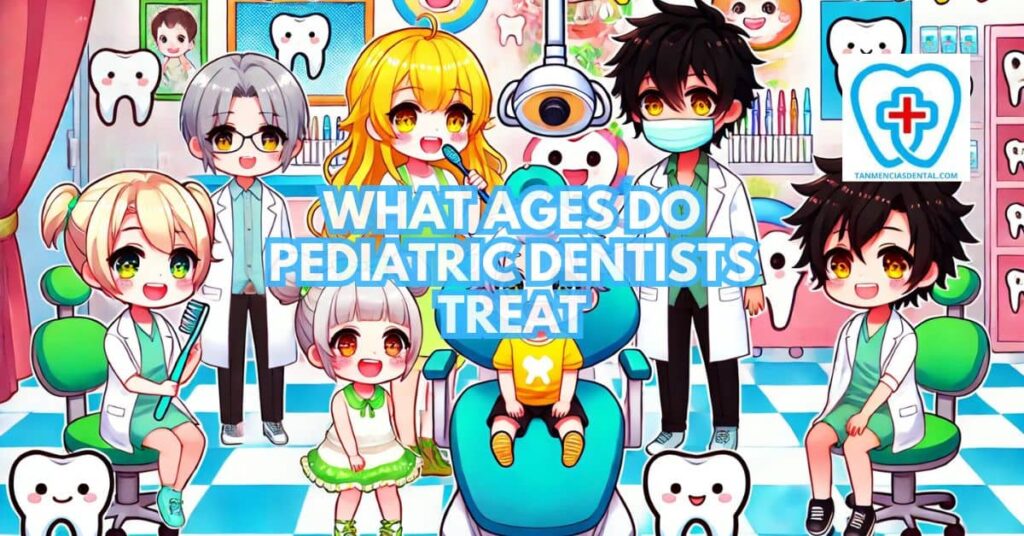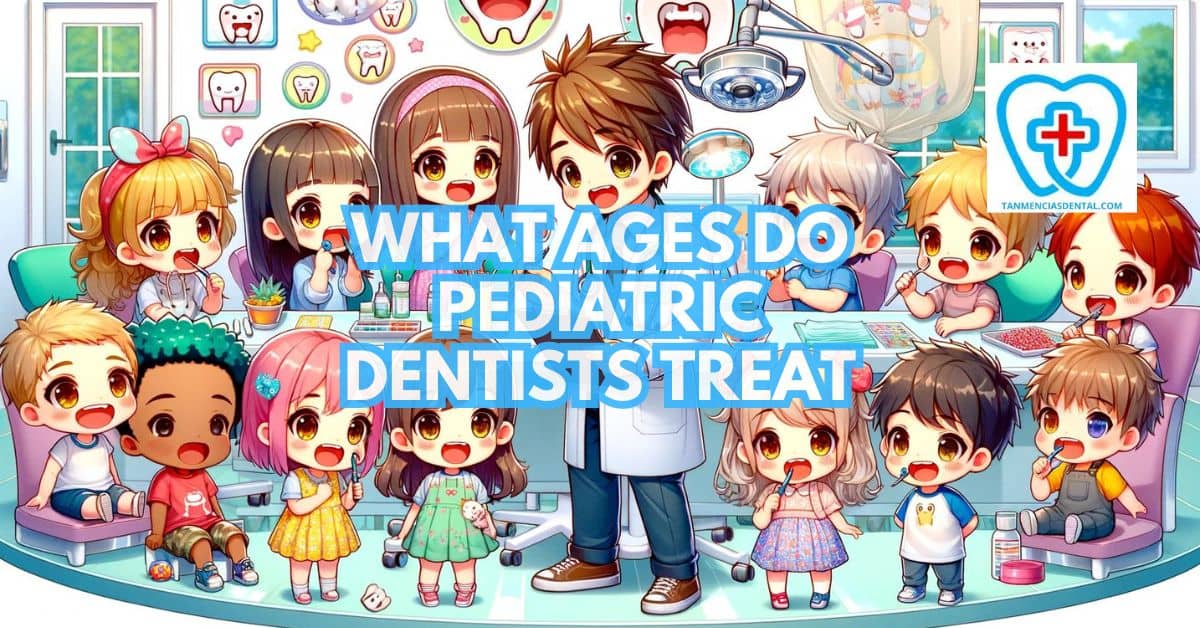Pediatric dentists are dental specialists who provide care for children at different stages of growth, focusing on the unique needs of young patients.
Their work is aimed at promoting good oral health from infancy through the teenage years.
Pediatric dental care involves preventive services like cleanings and fluoride treatments, as well as addressing dental issues that may arise as a child grows.
Knowing the ages they serve helps parents ensure their child gets the right care at the right time.
We’ll explain the range of ages covered by pediatric dentists and what each stage typically involves.
1. Understanding Pediatric Dentistry: What It Is and Who It Serves
Pediatric dentistry is a field that focuses specifically on the oral health of children, from birth until they become young adults.
Dentists in this field receive extra training on how to handle children’s changing dental needs as they grow.
They also learn to understand and manage behaviors, helping to make dental visits less stressful for young patients.
Pediatric dentists not only treat children but also educate parents on how to keep their child’s teeth and gums healthy.
Their goal is to set the foundation for good oral habits and prevent dental problems in the future.
🦷 Brushing Your Teeth Before Surgery: What You Need to Know About Pre-Operative Guidelines
2. Typical Age Range: What Ages Do Pediatric Dentists Treat?
The age range for pediatric dental care usually starts from infancy and extends up to 18 years old.
Infants may need care for the first baby teeth, while teenagers often face issues like braces or wisdom teeth.
Pediatric dentists are skilled in dealing with the different needs that arise during these years, such as tooth decay in young children or sports-related injuries in teens.
They aim to provide the right type of care for each age group to ensure that the child’s mouth develops properly.
By working with children at different stages, they can help avoid dental issues later in life.
🦷 Post-Wisdom Teeth Surgery: Can You Brush Your Teeth? Essential Tips for a Smooth Recovery
3. The Importance of Your Child’s First Dental Visit
The first dental visit is an important step in making sure a child’s teeth develop in a healthy way.
Experts recommend that this visit take place by the child’s first birthday, or within six months of the first tooth coming in.
Early visits help dentists find potential problems, like tooth decay or delayed tooth development, before they become serious.
Pediatric dentists use these initial appointments to educate parents on topics like teething, brushing techniques, and avoiding harmful habits such as thumb-sucking.
Starting dental care early sets the stage for a lifetime of good oral health.
🦷 Battling Bad Breath? Discover the Reasons Why Brushing Alone Isn’t Enough
4. Dental Care for Infants and Toddlers: Key Considerations
For infants and toddlers, dental care is mostly about preventing early problems and guiding parents on how to care for tiny teeth.
Baby teeth begin to come in around six months of age, and these first teeth play a role in eating, speaking, and saving space for permanent teeth.
Pediatric dentists help parents learn how to properly clean a baby’s mouth, including using a soft brush and a tiny amount of toothpaste.
They also discuss teething, which can cause discomfort, and suggest ways to soothe the gums.
Early dental visits can help detect issues like baby bottle tooth decay and ensure healthy oral development.
🦷 Mouthwash Dilemma: Should You Use It Before or After Brushing Your Teeth?

5. Addressing Dental Needs in Preschool-Aged Children
Preschool-aged children, usually between 3 and 5 years old, often require extra attention to prevent cavities, as sugary snacks and drinks can lead to tooth decay.
Pediatric dentists can apply fluoride treatments and dental sealants to protect the teeth from cavities.
At this stage, it’s also important to teach proper brushing and flossing techniques, as children may need help with these skills.
Dentists may evaluate the child’s bite and jaw growth to identify any potential alignment issues.
Addressing these concerns early can reduce the risk of needing more complex dental treatments later.
🦷 Natural Remedies for Cavities: How Do Holistic Dentists Approach Dental Health?
6. School-Aged Children: Focus on Permanent Teeth and Prevention
For school-aged children, usually from 6 to 12 years, the primary focus shifts to the care of permanent teeth as they begin to emerge.
Regular checkups help ensure that new teeth are coming in correctly and that there are no signs of tooth decay or gum problems.
Preventive measures like fluoride treatments and sealants can be used to protect permanent teeth from cavities.
Pediatric dentists also start to look for signs of orthodontic needs, such as crowded or crooked teeth, and may refer the child for an evaluation if necessary.
This age group benefits from guidance on how to take care of their own oral hygiene routines more independently.
🦷 Baby Gingivitis: Key Preventive Tips Every Parent Must Know to Protect Little Smiles
7. Teenagers and Adolescents: Unique Dental Challenges
Teenagers face different dental challenges compared to younger children, such as dealing with braces, wisdom teeth, and the risk of tooth damage from sports.
Dental visits during the teen years often include monitoring the growth of wisdom teeth and assessing whether they need to be removed.
Pediatric dentists help teens understand the importance of keeping their teeth and braces clean to avoid cavities and gum problems.
Some teens may also experience oral issues related to habits like drinking sugary drinks or using tobacco products.
Addressing these challenges helps ensure that teens maintain a healthy smile as they move into adulthood.
🦷 Can Brushing Your Teeth Actually Whiten Them? Unraveling the Myths for a Brighter Smile
8. Caring for Children with Special Needs in Pediatric Dentistry
Children with special needs may face unique dental challenges due to physical, developmental, or behavioral conditions.
Pediatric dentists are trained to provide care that accommodates these needs, such as using calming techniques or modifying the dental environment.
They may also work closely with other healthcare providers to create a comprehensive care plan that addresses specific concerns.
Regular dental visits are especially important for children with special needs, as they may be at a higher risk for tooth decay or gum disease.
The goal is to ensure each child receives proper oral care in a way that is comfortable and effective.
🦷 Decoding Broken Tooth Pain: Understanding the Causes and Finding Effective Solutions
9. Transitioning from Pediatric to Adult Dentistry: What to Expect
As children approach age 18, it’s time to consider transitioning from pediatric to general dentistry.
Pediatric dentists can help families find a general dentist who is a good fit and share the child’s dental records to ensure a smooth handover.
This transition marks a shift in dental care needs, as adult-focused care may involve different preventive measures and treatments.
It’s also an opportunity to review the child’s dental history and discuss any ongoing concerns, such as wisdom teeth or orthodontic care.
Preparing for this change ensures the young adult continues to receive proper dental attention.
🦷 Can Saltwater Be Your Ally Against Gum Disease? Explore the Benefits and Risks
10. Preventive Care: Building Healthy Oral Habits for Life
Preventive care is a key part of pediatric dentistry, aiming to stop problems before they start and teach kids how to take care of their teeth.
This includes regular cleanings, fluoride treatments, and applying dental sealants to protect against cavities.
Pediatric dentists also educate children and parents about the right ways to brush, floss, and maintain a healthy diet for strong teeth.
By focusing on prevention from a young age, dentists help establish habits that can last a lifetime.
These habits lower the risk of developing serious dental problems in adulthood.
🦷 Unmasking Gingivitis: Surprising Foods That Could Be Harming Your Child’s Oral Health
👨⚕️ Conclusion
Pediatric dentists play an important role in keeping children’s teeth healthy from infancy through the teenage years.
They offer specialized care tailored to different stages of growth, addressing various dental needs that change over time.
From teaching proper brushing habits to managing more complex dental challenges, they help lay a foundation for lifelong oral health.
The care provided by pediatric dentists not only treats existing problems but also helps prevent future issues.
Understanding the ages and stages they cover ensures that children receive the appropriate dental care at every step of their development.
😊 Self-Promotion
Visit Tan-Mencias Dental Clinic in Parang, Marikina City, where we provide quality dental care for the whole family.
Our friendly and skilled team is here to help you achieve a healthy smile in a comfortable and welcoming environment.
Have questions or need to book an appointment?
Feel free to call us at 9171451074, message us on our Facebook page, or use the contact form on our website.
We look forward to taking care of your dental needs!

